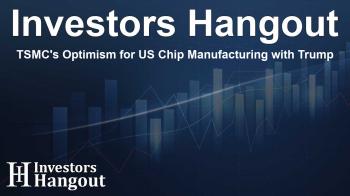TSMC's Optimism for US Chip Manufacturing with Trump

TSMC's Enduring Confidence in U.S. Chip Manufacturing
Taiwan Semiconductor Manufacturing Co. (NYSE: TSM) is expressing strong confidence in the continuation of U.S. government support for its Arizona chip plants, particularly under the incoming administration. This follows previous criticisms surrounding the Taiwanese semiconductor industry, yet TSMC remains optimistic about securing the necessary backing.
Government Support and Initial Funding
TSMC's CFO, Wendell Huang, announced they have already received a crucial installment of $1.5 billion as part of the promised $6.6 billion funding through the CHIPS Act. This funding is a key component of an initiative aimed at bolstering domestic semiconductor manufacturing.
Details of the CHIPS Initiative
The CHIPS Act is part of a broader strategy developed by the current administration to enhance U.S. chip production capabilities. Huang noted that this initial allocation of funds marks the beginning of a partnership intended to progress as various milestones are achieved.
Challenges Amidst Optimism
Despite prior campaign rhetoric that could raise concerns about Taiwan's role in the semiconductor market, TSMC's investment in Arizona, exceeding $65 billion across multiple facilities, is critical for US efforts to ramp up chip manufacturing. TSMC is poised to start operations at its first Arizona facility, which is producing advanced chips, with further expansions planned in the coming years.
Maintaining Strong Connections with U.S. Authorities
In a recent earnings call, CEO C.C. Wei emphasized TSMC's strong and cooperative relationship with U.S. regulators. This positive dynamic, he assured, will continue, with TSMC maintaining open lines of communication with all levels of government.
Plans for Future Operations
While TSMC is aware of the potential hurdles in its U.S. expansion, including regulatory challenges and labor shortages, the company is committed to achieving production quality equivalent to its operations in Taiwan. The firm anticipates significant growth in AI chip demand, projecting a doubling of AI-related revenues by 2025.
Looking Ahead: A Collaborative Future
As public discussions surrounding defense costs and trade echo, there's an underlying acknowledgment that a strong semiconductor sector is pivotal for both economic competitiveness and national security. TSMC's strategy reflects this awareness, balancing ambition with collaboration.
Frequently Asked Questions
What is the primary goal of TSMC's Arizona plants?
The main goal is to bolster U.S. semiconductor manufacturing capabilities and enhance the domestic supply chain.
How much funding has TSMC received from the government?
TSMC received its first installment of $1.5 billion as part of a promised $6.6 billion from the CHIPS Act.
What challenges does TSMC face in U.S. operations?
Challenges include lengthy construction timelines due to regulations and shortages of skilled labor.
When is TSMC's second Arizona facility expected to open?
The second facility is projected to begin operations in 2028.
What are TSMC's revenue projections for AI-related products?
TSMC expects its AI-related revenue to double by 2025, indicating a strong growth trajectory in this segment.
About Investors Hangout
Investors Hangout is a leading online stock forum for financial discussion and learning, offering a wide range of free tools and resources. It draws in traders of all levels, who exchange market knowledge, investigate trading tactics, and keep an eye on industry developments in real time. Featuring financial articles, stock message boards, quotes, charts, company profiles, and live news updates. Through cooperative learning and a wealth of informational resources, it helps users from novices creating their first portfolios to experts honing their techniques. Join Investors Hangout today: https://investorshangout.com/
Disclaimer: The content of this article is solely for general informational purposes only; it does not represent legal, financial, or investment advice. Investors Hangout does not offer financial advice; the author is not a licensed financial advisor. Consult a qualified advisor before making any financial or investment decisions based on this article. The author's interpretation of publicly available data presented here; as a result, they should not be taken as advice to purchase, sell, or hold any securities mentioned or any other investments. If any of the material offered here is inaccurate, please contact us for corrections.
